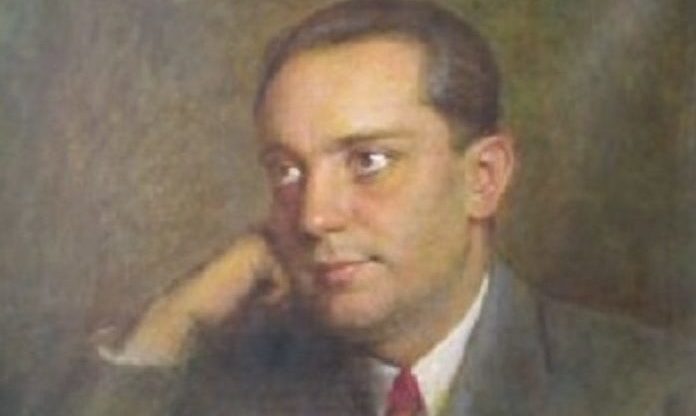The Kornitzer Collection by Jim Hetherington – April 25, 2019
back to the Special Collections Blog

Fleeing from the Nazis and Communists, Bela Kornitzer left his native country Hungary. He arrived in the United States in 1947 and learned English largely impart by going to movies. Almost immediately writing a series of magazine articles based on interviews with leading public figures, his career launched as an American political biographer. In this special collection called Bela Kornitzer Papers, we have copies of his articles and books, cassette tapes and phonodiscs of interviews, correspondence, newspaper clippings, typescripts, notes, documents, interviews, scrapbooks, photographs, book reviews, and more than 40 signed or dedicated photographs of public figures. Before me, I have a guidebook from an exhibition of the aforementioned collection.
Dated March 15th to May 7th, 2004, the collection divides into four cases, each highlighting items associating with various presidencies. The breadth of this collection is great. Roosevelts / President Truman / President Eisenhower / Presidents Nixon, Kennedy and Johnson; each case has quality artifacts that paint a picture about not only what was communicated but how they came across and made an impact on the lives around them.
The Roosevelt family! Kornitzer posed a paradigm-shifting question regarding which one of the sons of Franklin D. Roosevelt struck Anna Roosevelt Boettiger (the president’s daughter) as the closest resemblance to FDR physically and spiritually. On the letter featured, Anna replied with a resolution: “I am sorry but this question I prefer not to answer as I hope to continue living peacefully with my brothers for many years to come!” Kornitzer’s digging falls beneath the overarching theme covered in his work for American Fathers and Sons. His focus (based on the title) focused specifically on “its role in molding the characters of some of the most distinguished men of the time.” It says here in the guidebook, “[Kornitzer] theorized that the essence of our democracy is reflected in the tolerant, democratic attitude prevailing in the typical American family.” Interviewing Kornitzer would have been very fascinating.
Farther along this line of thinking, not only were the offspring of presidents studied, but the parents of them were included within this project. As featured in The Independence Examiner, the Trumans were a close family. Kornitzer also became close with a family like the Trumans as seen by a thank you letter to Kornitzer for his “telegram congratulating the Trumans on their daughter’s engagement, March 14, 1956. The dated nature of these items is clear given the lexicon/vocabulary utilized. For instance, kow-towing (in the context of Kornitzer not being subservient but extolling (praising) accomplishments of the presidents) means to act in an excessively subservient manner. Certainly one must know their way when it’s their day job.
The exhibition that was here in the Drew University Archives 14 year ago had some really choice intellectual information. I love the anecdote where President Eisenhower reflects upon Kornitzer’s work March 20, 1953: “I am personally, deeply touched by the fact that Mr. Kornitzer and the Cosmopolitan Magazine have undertaken to make a public record of what we boys think of our father…” there’s just something about humanizing one’s self with respect to the olden days. This revert to how things were for presidents is a common thread within his investigations. For instance, “[President Nixon] was worried about his lessons and grades; he was extremely interested in how things were going at school and the welfare of his friends.” It seems that Bela Kornitzer had family that was also affiliating with presidencies. In a letter of sympathy from Dwight D. Eisenhower to Mrs. Alicia Karpati (Kornitzer’s sister) on December 1, 1964, “It is tragic that a man who had come to understand our country so well and who interpreted it so vigorously should meet such an untimely end.” In retrospect, letters like that aren’t really sent nowadays, even in e-mail form.
Ultimately Bela Kornitzer’s authorship and journalism earned his place at Drew in 1995 as an award established to honor publications by Drew University faculty. Additionally, in 2005, a second award was created for Drew graduates. If he were still alive today (a stretch being he’d be 109 years old) I would ask him what he thinks his life would have been like if he did not leave his birthplace early on. I have gratitude for Bela Kornitzer’s sister, Alicia who donated to our archives his work. Who will be the next great journalist? We need a lot for the news we read is slowly becoming more civic and community-based instead of politician and ad-based. Bela Kornitzer and his impact will continue to play a part in recognizing the work of our faculty here as well as encourage all who know him to look at relationships with friends, family, and philanthropy. I wonder what next great works will land on our shelves